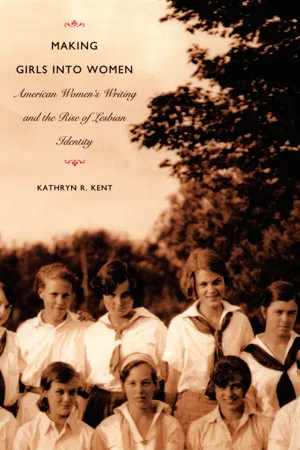
Making Girls into Women
American Women's Writing and the Rise of Lesbian Identity
- English
- PDF
- Available on iOS & Android
Making Girls into Women
American Women's Writing and the Rise of Lesbian Identity
About this book
Kent not only analyzes how texts represent queer erotics, but also theorizes how texts might produce them in readers. She describes the ways postbellum sentimental literature such as that written by Harriet Beecher Stowe, Louisa May Alcott, and Emma D. Kelley eroticizes, reacts against, and even, in its own efforts to shape girls' selves, contributes to the production of queer female identifications and identities. Tracing how these identifications are engaged and critiqued in the early twentieth century, she considers works by Djuna Barnes, Gertrude Stein, Marianne Moore, and Elizabeth Bishop, as well as in the queer subject-forming effects of another modern invention, the Girl Scouts. Making Girls into Women ultimately reveals that modern lesbian identity marks an extension of, rather than a break from, nineteenth-century women's culture.
Frequently asked questions
- Essential is ideal for learners and professionals who enjoy exploring a wide range of subjects. Access the Essential Library with 800,000+ trusted titles and best-sellers across business, personal growth, and the humanities. Includes unlimited reading time and Standard Read Aloud voice.
- Complete: Perfect for advanced learners and researchers needing full, unrestricted access. Unlock 1.4M+ books across hundreds of subjects, including academic and specialized titles. The Complete Plan also includes advanced features like Premium Read Aloud and Research Assistant.
Please note we cannot support devices running on iOS 13 and Android 7 or earlier. Learn more about using the app.
Information
Table of contents
- Contents
- Acknowledgements
- Introduction
- 1. "Single White Female": The Sexual Politics of Spinsterhood in Harriet Beecher Stowe's Oldtown Folks
- 2. “Trying All Kinds": Louisa May Alcott's Pedagogic Erotics
- 3. "Scouting for Girls": Reading and Recruitment in the Early Twentieth Century
- 4. "Excreate a No Sense": The Erotic Currency of Gertrude Stein's Tender Buttons
- 5. The M Multiplying: Marianne Moore, Elizabeth Bishop, and the Pleasures of Influence, Part 1
- 6. Influence and Invitation: Marianne Moore, Elizabeth Bishop, and the Pleasures of Influence, Part 2
- Conclusion
- Notes
- Bibliography
- Index